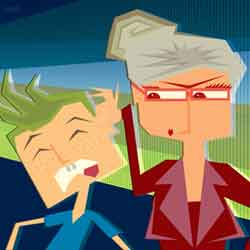This is a guest post by Caleb J Ross as part of his Stranger Will Tour for Strange blog tour. He will be guest-posting beginning with the release of his novel Stranger Will in March 2011 to the release of his second novel, I Didn’t Mean to Be Kevin and novella, As a Machine and Parts, in November 2011. If you have connections to a lit blog of any type, professional journal or personal site, please contact him. To be a groupie and follow this tour, subscribe to the Caleb J Ross blog RSS feed. Follow him on Twitter: @calebjross.com. Friend him on Facebook: Facebook.com/rosscaleb
 When I was younger, I took comfort in open-ended answers from my teachers and professors. I’d ask about the serial comma rule or how to handle semi-colons and answers would vary from the dismissive (“Nobody really knows when to use the serial comma”) to the Socratic (“How do you feel you should use semi-colon?”). This level of freedom with language was something I had never experienced before. It felt good to realize just how little in this world could be definitely right or wrong.
When I was younger, I took comfort in open-ended answers from my teachers and professors. I’d ask about the serial comma rule or how to handle semi-colons and answers would vary from the dismissive (“Nobody really knows when to use the serial comma”) to the Socratic (“How do you feel you should use semi-colon?”). This level of freedom with language was something I had never experienced before. It felt good to realize just how little in this world could be definitely right or wrong.
But it got old. After graduating college I suddenly found myself having to provide actual answers. When in school, the future is a vague, ever-distant destination. Post school, the destination suddenly becomes the present. Answers are important; philosophizing about them is not. The desire for absolutes extended beyond the grammatical and into the professional. So today, for fiction writers suffering the same confusion as I have (and still do, in many respects), below is a list of absolutes. Take comfort.
1. Use the word “that” 97% less than you do right now. “That” is a buffer word and usually serves to clog the flow of a sentence. Find a way around it.
2. Replace almost every instance of a “to be” verb with something else. The difference between the right verb and the almost right verb is the difference between a right sentence and a wrong sentence. Go for active verbs and you will get engaged readers.
3. Avoid “(blank) of the (blank)” phrase constructions (e.g. “chicken of the sea”). These phrases usually indicate weak metaphors. Much of the time, the phrasing can be changed for better impact (e.g. “sea chicken”). Always use as few words as possible to tell a story.
4. Read only one publishing how-to book, if you must read any. No more than one. Be wary of publishers who make their money by selling tools to writers. If you’ve read a handful of Writer’s Digest how-to write, how-to query an agent, how-to submit a manuscript books, you’ve read them all (Christina Katz’s Get Known Before the Book Deal is a definite exception).
5. Follow these Twitter accounts:
6. Subscribe to these blogs:
- ArtsJournal: Daily Arts News – Publishing
- Author Scoop
- Book trade news from Book2book
- How To Write Badly Well
- How Publishing Really Works
- mediabistro.com: GalleyCat
- Nathan Bransford – Literary Agent
- Publisher’s Weekly Latest News
- The Shatzkin Files
- There Are No Rules
- Springwise
- The Self-Publishing Review
- VentureBeat
- We Who Are About To Die
7. Listen to these industry and career-wise author podcasts:
- New York Times Book Review
- Mur Lafferty’s I Should Be Writing
- NPR Books
- The Velvet Podcast
- Writing Excuses
- Beyond the Book
photo credit: http://www.flickr.com/photos/ajdagregorcic










Pingback: Stranger Will tour stop #41: Gordon Highland’s blog | Caleb J Ross The World's First Author Blog | calebjross